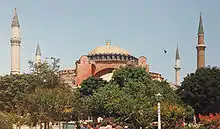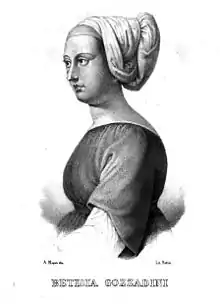1261
Year 1261 (MCCLXI) was a common year starting on Saturday (link will display the full calendar) of the Julian calendar.
| Millennium: | 2nd millennium |
|---|---|
| Centuries: | |
| Decades: | |
| Years: |
| 1261 by topic |
|---|
| Leaders |
|
| Birth and death categories |
| Births – Deaths |
| Establishments and disestablishments categories |
| Establishments – Disestablishments |
| Art and literature |
| 1261 in poetry |
| Gregorian calendar | 1261 MCCLXI |
| Ab urbe condita | 2014 |
| Armenian calendar | 710 ԹՎ ՉԺ |
| Assyrian calendar | 6011 |
| Balinese saka calendar | 1182–1183 |
| Bengali calendar | 668 |
| Berber calendar | 2211 |
| English Regnal year | 45 Hen. 3 – 46 Hen. 3 |
| Buddhist calendar | 1805 |
| Burmese calendar | 623 |
| Byzantine calendar | 6769–6770 |
| Chinese calendar | 庚申年 (Metal Monkey) 3957 or 3897 — to — 辛酉年 (Metal Rooster) 3958 or 3898 |
| Coptic calendar | 977–978 |
| Discordian calendar | 2427 |
| Ethiopian calendar | 1253–1254 |
| Hebrew calendar | 5021–5022 |
| Hindu calendars | |
| - Vikram Samvat | 1317–1318 |
| - Shaka Samvat | 1182–1183 |
| - Kali Yuga | 4361–4362 |
| Holocene calendar | 11261 |
| Igbo calendar | 261–262 |
| Iranian calendar | 639–640 |
| Islamic calendar | 659–660 |
| Japanese calendar | Bun'ō 2 / Kōchō 1 (弘長元年) |
| Javanese calendar | 1170–1171 |
| Julian calendar | 1261 MCCLXI |
| Korean calendar | 3594 |
| Minguo calendar | 651 before ROC 民前651年 |
| Nanakshahi calendar | −207 |
| Thai solar calendar | 1803–1804 |
| Tibetan calendar | 阳金猴年 (male Iron-Monkey) 1387 or 1006 or 234 — to — 阴金鸡年 (female Iron-Rooster) 1388 or 1007 or 235 |
| Wikimedia Commons has media related to 1261. |

Hagia Sophia in Constantinople. The city is captured by the Empire of Nicaea on July 25, thus re-establishing the Byzantine Empire.
Events
- January – Pope Alexander IV prohibits the Flagellants.
- March 13 – The Treaty of Nymphaeum, directed against the Latin Empire of Constantinople, is signed between the Republic of Genoa and the Nicaean emperor Michael VIII Palaiologos.[1]
- June 12 – King Henry III of England obtains a papal bull releasing him from his oath to maintain the Provisions of Oxford, setting the stage for the Second Barons' War (1263–1267).[2]
- July 4 – Baybars becomes the new Mamluk Sultan of Egypt.[1]
- July 23 – Battle of Callann: The Normans, under John FitzGerald, 1st Baron Desmond, are defeated by the Gaelic forces of Fínghin Mac Carthaigh, King of Desmond.[3]
- July 25 – The city of Constantinople is recaptured by Nicaean forces under the command of Alexios Strategopoulos, thus ending the Latin Empire and re-establishing the Byzantine Empire.[1]
- August 15 – The Nicaean ruler Michael VIII Palaiologos is crowned Byzantine Emperor in Constantinople.[1]
- August 29 – Pope Urban IV succeeds Pope Alexander IV as the 182nd pope, the last man to do so without being a cardinal first.
- December 25 – The 11-year-old John IV Laskaris is blinded by order of his cousin and nominal co-ruler of the Byzantine Empire, Michael VIII Palaiologos, in Nicaea to render him ineligible for the throne, and he is exiled.
- The population of Greenland accepts the overlordship of the King of Norway.
- Livonian Crusade: The Estonian rebellion on Saaremaa Island is forced down by the Livonian Order.
- The Japanese Bun'ō era ends, and the Kōchō era begins.
- The Convent of Wurmsbach is established in Switzerland.
- Baibars reestablishes the Abbasid Caliphate in Cairo.
- Béla IV of Hungary repels a Tatar invasion.
- Kublai Khan, who became a Khagan claimant in the previous year, releases 75 Song Dynasty Chinese merchants from captivity, after they had been captured along the border of his Empire, and the Southern Song Dynasty of China. This is an act to increase his reputation amongst the Chinese, shore up his legitimacy as a just ruler, and to gain more defectors from the Southern Song Dynasty.
- The earliest extant Chinese illustration of Pascal's Triangle is from Yang Hui's book Xiangjie Jiuzhang Suanfa, published in this year, although knowledge of Pascal's Triangle existed in China by at least 1100.
Births
- February 1 – Walter de Stapledon, English bishop (d. 1326)
- February 11 – Otto III, Duke of Bavaria (d. 1312)
- February 28 – Margaret of Scotland, Queen of Norway (d. 1283)
- March 1 – Hugh le Despenser, 1st Earl of Winchester (d. 1326)
- July 25 – Arthur II, Duke of Brittany (d. 1312)
- October 9 – King Denis of Portugal (d. 1325)
- date unknown
- Bohemond VII, Count of Tripoli, prince of Antioch (d. 1287)
- Prince Daniel of Moscow, son of Alexander Nevsky (d. 1303)
- Konoe Iemoto, Japanese kugyō (d. 1296)
- Albertino Mussato, Italian statesman and writer (d. 1329)
- Władysław I the Elbow-high, King of Poland (d. 1333)
- Constantine Palaiologos, Byzantine prince and general (d. 1306)
Deaths

Bettisia Gozzadini, lithograph from Carolina Bonafede, Cenni biografici ... , 1845
- February 28 – Henry III, Duke of Brabant
- May 25 – Pope Alexander IV
- July 8 – Adolf IV of Holstein, Count of Schauenburg
- September – Plaisance of Antioch, queen of Cyprus
- September 18 – Konrad von Hochstaden, Archbishop of Cologne
- November 9 – Sanchia of Provence, queen consort of Germany
- date unknown
- An-Nasir Dawud, Ayyubid sultan of Damascus and Emir of Kerak
- Bettisia Gozzadini, Italian scholar (b. 1209)
- Qin Jiushao, Chinese mathematician of the Song Dynasty (b. 1202)
- Patriarch Nicephorus II of Constantinople
References
- Lock, Peter (2013). The Routledge Companion to the Crusades. Routledge. p. 112. ISBN 9781135131371.
- Williams, Hywel (2005). Cassell's Chronology of World History. London: Weidenfeld & Nicolson. pp. 144–146. ISBN 0-304-35730-8.
- BBC History, July 2011, p. 12.
This article is issued from Wikipedia. The text is licensed under Creative Commons - Attribution - Sharealike. Additional terms may apply for the media files.